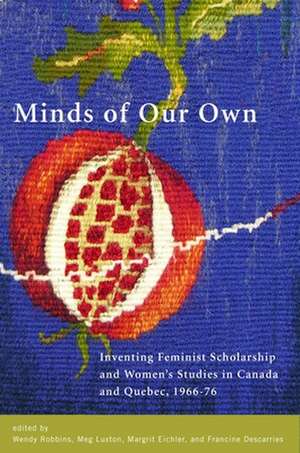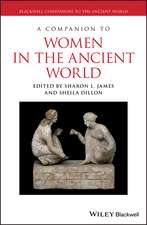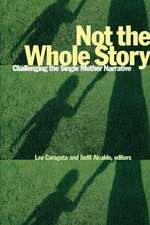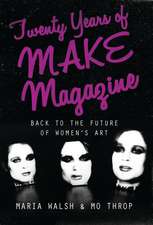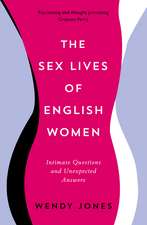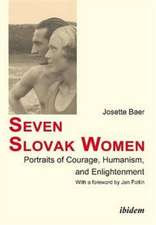Minds of Our Own
Editat de Wendy Robbins, Meg Luxton, Margrit Eichler, Francine Descarriesen Limba Engleză Paperback – 30 apr 2008
Preț: 374.62 lei
Nou
71.68€ • 75.03$ • 59.66£
Carte tipărită la comandă
Livrare economică 01-15 aprilie
Specificații
ISBN-10: 1554580374
Pagini: 414
Dimensiuni: 156 x 229 x 11 mm
Greutate: 0.61 kg
Editura: Wilfrid Laurier University Press
Cuprins
Table of Contents for
Minds of Our Own: Inventing Feminist Scholarship and Women's Studies in Canada and Québec, 1966-76, edited by Wendy Robbins, Meg Luxton, Margrit Eichler, and Francine Descarries
PREFACE
CHANGING TIMES
Women's Organizations (before 1960)
Women's Changing Social Position
The Women's Movement of the 1960s and 1970s
Women in Post-Secondary Education
Feminist Scholarship and Women's Studies
ESSAYS
Creating a Tradition of Canadian Women Writers and Feminist Literary Criticism | Clara Thomas
Mother Was Not a Person, So I Became a Feminist | Marguerite Andersen
Fanning Fires: Women's Studies in a School of Social Work | Helen Levine with Faith Schneider
Feminism: A Critical Theory of Knowledge | Marie-Andrée Bertrand
Women's Studies: A Personal Story | Dorothy E. Smith
Contributing to the Establishment of Women's Studies and Gender Relations | Anita Caron
Feminism and a Scholarly Friendship | Jill Ker Conway and Natalie Zemon Davis
Midwife to the Birth of Women's Studies at McGill | Margaret Gillett
How the Simone de Beauvoir Institute of Concordia University Grew from Unlikely Beginnings | Maïr Verthuy
Moments in the Making of a Feminist Historian | Alison Prentice
Doing Feminist Studies without Knowing It | Micheline Dumont
A Matrix of Creativity | Frieda Forman
Transforming the Academy and the World | Deborah Gorham
Reminiscences of a Male Supporter of the Movement towards Women's Liberation | Leslie Marshall
You Just Had To Be There | Greta Hofmann Nemiroff
The Second Wave: A Personal Voyage | Sandra Pyke
A Lifetime of Struggling to Belong | Vanaja Dhruvarajan
Once Upon a Time There Was the Feminist Movement | Nadia Fahmy-Eid
Women's Studies at the University of Alberta | Rosalind Sydie, Patricia Prestwich, Dallas Cullen
Women's Studies and the Trajectory of Women in Academe | Annette Kolodny
Women's Studies at Simon Fraser University, 1966-76: A Dialogue | Andrea Lebowitz, Honoree Newcombe, Meredith M. Kimball
Nascent, Incipient, Embryonic, and Ceremonial Women's Studies | Linda Christiansen-Ruffman
To Challenge the World | Margrit Eichler
From Male and Female Roles to Gender Relations: A Scientific and Political Trajectory | Danielle Juteau
Second Wave Breaks on the Shore of U of T | Lorna Marsden
Surviving Political Science ... and Loving It | Jill Vickers
Blood on the Chapel Floor: Adventures in Women's Studies | Kay Armatage
Genesis of a Journal | Donna Smyth
The Saga | Marylee Stephenson
Coming of Age with Women's Studies | Meredith M. Kimball
Doing Women's Studies | Pat Armstrong
Pioneer in Feminist Political Economy: Overcoming the Disjuncture | Joan McFarland
Women's Studies at Guelph | Terry Crowley
Women's Studies: Oppression and Liberation in the University | Meg Luxton
Reflections on Teaching and Writing Feminist Philosophy in the 1970s | Susan Sherwin
From Marginalized to "Establishment": Doing Feminist Sociology | Maureen Baker
"To Ring True and Stand for Something" | Wendy Robbins
Socialist Feminist and Activist Educator | Linda Briskin
My Path to Feminist Philosophy, 1970-76 | Christine Overall
Women's Sight: Looking Backwards into Women's Studies in Toronto | Ceta Ramkhalawansingh
PERSONAL AND INTELLECTUAL REVOLUTION: SOME REFLECTIONS
The Patriarchal Context
Countervailing Social Movements
Intersections of Gender, Race, Class, Sexual Orientation
Inventing a New Scholarship and New Structures
Disciplinarity and/or Interdisciplinarity
Student-Teacher Relations
Personal Impacts
Interesting Times
APPENDIXES
Appendix A. Alphabetical List of Authors
Appendix B. List of Authors by Discipline
NOTES ON CONTRIBUTORS
CUMULATIVE BIBLIOGRAPHY
INDEX
Notes on Contributors
Marguerite Anderson has lived and taught in Germany, France, Tunisia, Ethiopia, the United States, and Canada. She obtained a PhD from the Université de Montréal in 1965. In Canada, she taught French studies at Loyola (now Concordia) and the University of Guelph, where she was chair of the Department of Languages and Literatures. She has held the Nancy Ruth Chair at Mount Saint Vincent University and received a doctorate, H.C., from that university in 1999. She was a founding member of the Canadian Association of University Teachers Committee on the Status of Women in the early 1970s.
Kay Armatage is a professor at the University of Toronto, cross-appointed to Cinema Studies, Innis College, and the Women and Gender Studies Institute. She is the author of The Girl from God's Country: Nell Shipman and the Silent Cinema (2003), co-editor of Gendering the Nation: Canadian Women's Cinema (1999), and editor of Equity and How to Get It (1999); author of articles on women filmmakers, feminist theory and Canadian cinema; and producer/director of documentary and experimental narrative films. At U of T, she was director of the Undergraduate Women's Studies Program 1987-92 and founding director of the Graduate Collaborative Program in Women's Studies 1994-2000.
Pat Armstrong has served as chair of the Department of Sociology at York University and director of the School of Canadian Studies at Carleton University. Currently, she is a partner in the National Network on Environments and Women's Health, and she chairs a working group on health reform that crosses the Centres of Excellence for Women's Health. She holds a Canadian Health Services Research Foundation/Canadian Institutes of Health Research Chair in Health Services. She is co-author or editor of several books on health care, including Exposing Privatization: Women and Health Reform in Canada (2001), Heal Thyself: Managing Health Care Reform (2000), and Universal Health Care: What the United States Can Learn from Canada (1998).
Maureen Baker is a professor in the Department of Sociology at the University of Auckland, New Zealand. She has taught in Canada, Australia, and New Zealand, and worked as a researcher in Ottawa for Canada's Parliament. Her main areas of teaching and research are changing families and comparative policies for families with children. She is the author of fifteen books and over ninety scholarly articles.
Marie-Andrée Bertrand received her D. Criminology from the University of California at Berkeley (1967) and is currently professor emeritus at the Université de Montréal (1996). She has taught and conducted research at the universities of Hamburg, Oslo, and Berkeley; at the Centre d'études sociologiques sur le droit et les institutions pénales in Guyancourt, France; and at the International Institute for the Sociology of Law in Onati, Spain. She was a member of the Law Commission of Canada Advisory Council until its abolition on September 29, 2006, and is an officier de l'Ordre national du Québec.
Linda Briskin, a professor in the Social Science Division and the School of Women's Studies at York University, has both an activist and a scholarly interest in the documentation and development of feminist strategies for change. She has published widely on women and unions, women's organizing, and inclusive pedagogies, and has been involved in union and university activism for many decades.
Professor emeritus at the Université du Québec à Montréal, Anita Caron retired from the Department of Religious Sciences in June 1993. Her main areas of teaching and research were feminist studies, moral and religious education, ethics, and teacher training.Much of her research concerned the question of women and religion. Co-founder of the Institut de recherches et d'études féministes, she was also its first director, from 1990 to 1993.
Linda Christiansen-Ruffman is professor of sociology at Saint Mary's University, where she helped to initiate women's studies, including the interuniversity graduate program. As a feminist, she has led both sociology and women's organizations locally, nationally, and globally. She increasingly trusts women's wisdom to resist patriarchal forms and to find alternative ways.
Jill Ker Conway taught American social and intellectual history at the University of Toronto (1964-75) and served as vice-president of Internal Affairs (1973-75) the first woman to hold vice-presidential rank. In 1975, she became the first woman president of Smith College, and, a decade later, visiting professor in mit's Program in Science, Technology, and Society. She holds thirty-eight honorary degrees and currently writes about autobiography and biography. She retains ties to Canada through her late husband, John J. Conway, the founding master of Founders College at York University, and as the 2007 recipient of the Sarah Shorten Award from the Canadian Association of University Teachers.
Terry Crowley is chair of the Department of History at the University of Guelph. The author of a dozen books, his most recent, Marriage of Minds: Isabel and Oscar Skelton Reinventing Canada (2003), won the Floyd S. Chalmers Award of the Champlain Society, the Clio Award, and an Honorable Mention for the Sir John A. Macdonald Award of the Canadian Historical Association.
Dallas Cullen has a BA in history from the University of Alberta, an MSc in psychology from Iowa State University, and a PhD in experimental social psychology from Ohio State University. She is Professor Emerita in the Department of Strategic Management and Organization in the School of Business at the University of Alberta, where she also served an eight-year term as chair of the Women's Studies Program. She was a founding member of Women in Scholarship, Engineering, Science, and Technology (wisest), and was awarded a lifetime membership in the Academic Women's Association of the University of Alberta.
Natalie Zemon Davis has been an innovator in the social and cultural history of early modern Europe, especially its working people and peasants. Over her years of teaching, she has been a founder of courses in the history of women at the University of Toronto, the University of California at Berkeley, and Princeton University. She is the author of eight books, all of them appearing in translations in Europe and Asia. In 1987 she became the second woman president of the American Historical Association (the only previous one was forty-four years earlier). Retired as Henry Charles Lea Professor of History at Princeton, she is now adjunct professor of history and professor of medieval studies at the University of Toronto.
Francine Descarries is a professor in the Department of Sociology at l'Université du Québec à Montréal and scientific director of the alliance Institute de recherches et d'études féministes/Relais-femmes, which does research on the Québec women's movement. In the early 1980s, she authored one of the first Québec books on women and "pink collar" work, L'école rose et les cols roses (1980). Jointly with Christine Corbeil, she published a reader on maternity entitled Espaces et temps de la maternité (2002). She has also recently edited volume 6 of the electronic journal Labrys (Québec-Brazil), which gives a picture of the research in partnership currently being done in Québec.
Vanaja Dhruvarajan is currently an adjunct professor at Carleton University, Ottawa. She completed her undergraduate education at the University of Mysore, India, and her graduate education at the University of Chicago.Her teaching and research interests include globalization, family and socialization, gender, anti-racism, and knowledge monopolies. She has done research in India and Canada, and has published several articles and books. She has served as president of the Canadian Sociology and Anthropology Association and the Canadian Women's Studies Association, as well as the Ruth Wynn Woodward Endowed Chair in Women's Studies at Simon Fraser University, Vancouver.
Micheline Dumont is a pioneer of women's history in Québec, having taught in that area at the Université de Sherbrooke from 1970 to 1999. As a member of the Clio Collective, she published L'histoire des femmes au Québec (1982) and Québec Women: A History (Women's Press, 1987). She is the author of many works, including Les couventines (1986) with Nadia Fahmy-Eid; Les religieuses sont-elles féministes? (1995); Découvrir la mémoire des femmes (2001); La pensée féministe au Québec (2003) with Louise Toupin; and Brève histoire des institutrices au Québec (2004) with Andrée Dufour.
Margrit Eichler is professor of sociology and equity studies at the Ontario Institute for Studies in Education at the University of Toronto. All of her research is feminist in orientation. Over her career, her major areas of interest have been family policy, reproductive technologies, sexist and other biases in research, eco-sociology, and the history of women's studies in Canada. At present, she is engaged in two large-scale research projects: on unpaid housework and lifelong learning, and on the bias free Framework (Building an Integrative Analytical System for Recognizing and Eliminating InEquities in Research and Policies).
Nadia Fahmy-Eid began her career as a professor of history at the Université du Québec à Montréal in 1970. She retired in 1997. Recipient of the Société Saint Jean-Baptiste's Prix Esdras-Minville for human sciences, she taught and researched in the history of ideas, the history of the education of girls and women's work, and the epistemology of history. In 2001, she and colleagues from various disciplines founded the Centre d'aide pédagogique aux étudiantes et aux étudiants as a means to support students in the methodology of intellectual work.
Frieda Johles Forman was born in Vienna and spent her early childhood as a refugee in Switzerland.At City College and City University of New York, she specialized in philosophy and German literature. She married, had two children, and was active in the anti-war movement before immigrating to Toronto in 1970. She introduced the first women's studies course while teaching at the Ontario College of Art, and subsequently established and coordinated the Women's Educational Resources Centre at the Ontario Institute for Studies in Education. She is currently a visiting scholar at the Centre for Women's Studies in Education, and writing a memoir of her childhood.
Margaret Gillett, a lifelong feminist, is retired now from teaching in the Faculty of Education at McGill, but never from the fray. She was involved in the creation of the McGill Centre for Teaching and Research on Women. Her portrait was painted by distinguished Australian artist Judy Cassab. Recent work includes Traf: A History of Trafalgar Schools for Girls (2000) and a profile on Maude Elizabeth Seymour Abbott for the Dictionary of Canadian Biography.
Deborah Gorham was a full-time member of the Department of History at Carleton University in Ottawa from 1969 to 2002,where she was active in teaching women's history and women's studies beginning in 1971. In retirement, she continues her affiliation with Carleton as a distinguished research professor. Her current research interests include gender and progressive education in the early twentieth century. She is the author of Vera Brittain: A Feminist Life (1996).
Danielle Juteau received her PhD in sociology from the University of Toronto in 1974 and is currently professor emeritus in the Department of Sociology at the Université de Montréal. She was a pioneer of teaching and research on the rapports sociaux de sexe (relations constituting sex categories), which she has expanded to apply to ethnic relations, the construction of ethnic and national boundaries, and citizenship. Ethnic Relations Chair at the Université de Montréal from 1991 to 2003, she went on to become a Pierre Elliott Trudeau Foundation Fellow from 2003 to 2006. Named to the Royal Society of Canada in 1996, she was the winner, in 2001, of the Prix Marcel-Vincent, awarded by the Association canadienne-française pour l'avancement des sciences.
Meredith M. Kimball taught in the Department of Psychology at the University of British Columbia from 1970 to 1976.During that time, she was a founder of women's studies at ubc. In 1976, she moved to Simon Fraser University in a joint appointment with women's studies and psychology. She has served as chair of the Department of Women's Studies at SFU several times and as associate dean in the Faculty of Interdisciplinary Studies. She retired from SFU in 2004.
Annette Kolodny is the College of Humanities Professor Emerita of American Literature and Culture at the University of Arizona, Tucson. Her scholarly and critical works include The Lay of the Land: Metaphor as Experience and History in American Life and Letters (1975); The Land Before Her: Fantasy and Experience of the American Frontiers, 1630-1860 (1984); and the groundbreaking essay "Dancing Through the Minefield: Some Observations on the Theory, Practice, and Politics of a Feminist Literary Criticism." She was formerly dean of the College of Humanities at the University of Arizona and, based on her experiences as a feminist administrator, she published Failing the Future: A Dean Looks at Higher Education in the Twenty-first Century (1998).
Andrea Lebowitz joined Simon Fraser University as a charter faculty member in 1965. She was a founder of the Department of Women's Studies and served as its first chair. She taught in English and women's studies, and served as associate dean of arts. She retired from SFU in 2001. She has published several books on women's nature writing.
Helen Levine is a pioneer of feminist counselling and taught women's studies at Carleton University's School of Social Work until her retirement in 1988. Helen received the Governor General's Persons Award in 1989. She is a founding member of Interval House of Ottawa-Carleton, a shelter for battered women and their children; and of the Crones, a self-help group for older women. She is a member of the Women's Envisioning Group in Ottawa, concerned with local and global feminist issues. She was a major participant in the film Motherland: Tales of Wonder, produced by the National Film Board's Studio D.
Meg Luxton is professor of women's studies and social sciences and director of the graduate program in women's studies at York University. Her main research interests are women's paid and unpaid work, the Canadian women's movement, and family and social policy. Her current research project investigates how personal caregiving responsibilities and social policies and programs designed to help people manage the demands of paid employment play out in the lives of the people affected by them.
Lorna Marsden is president emerita and professor,York University. Prior to joining York in 1997, she was on faculty at the University of Toronto (1972-92), president and vice-chancellor of Wilfrid Laurier University (1992-97), and a senator in the Parliament of Canada (1982-92). She was president of the National Action Committee on the Status of Women during 1975-77.
Leslie Marshall taught for many years in the Department of English at the University of Guelph. His main interest was dramatic literature. In 1974, he introduced the first course at Guelph on women's literature. With his wife, Linda, he is now living in retirement in Guelph.
Joan McFarland is a professor of economics and women's studies/gender studies at St. Thomas University in Fredericton, New Brunswick, where she has taught since 1971. Her research, which takes a feminist political economy approach, has been on various aspects of women and the economy in the Maritimes, in Canada, and across the globe. She is also a community activist and was the national president of the Canadian Congress for Learning Opportunities for Women in the late 1980s.
Greta Hofmann Nemiroff taught at Concordia University (formerly Sir George Williams University) from 1963-79, in the Department of English and as a founding member of the Women's Studies Program and the Simone de Beauvoir Institute. Since 1973, she has taught at Dawson College, where she is currently the coordinator of the Creative Arts, Literature and Language, and Women's Studies programs. From 1991-96, she held the joint chair ofWomen's Studies at Carleton University and the University of Ottawa, and from 1999-2004 she was the president of the Sisterhood Is Global Institute, an international feminist non-governmental organization.
Honoree Newcombe joined the Simon Fraser University library staff in 1971 while still a student. She has worked in graduate studies and as departmental administrator in the English department. She was a founder of the Department ofWomen's Studies and has served as the staff representative on the Women's Studies Coordinating Committee.
Christine Overall is a professor of philosophy at Queen's University, Kingston, where she served as an associate dean in the Faculty of Arts and Science (1997-2005). In 1998, she was elected to the Royal Society of Canada, and in 2005, she was appointed to a Queen's Research Chair, Queen's internal equivalent of the Canada Research Chairs. During 1993-2006, she authored a weekly feminist column,"In Other Words," in the Kingston Whig-Standard. Her 2003 book, Aging, Death, and Human Longevity, won awards from the Canadian Philosophical Association and the Royal Society of Canada. Married for thirty-five years, she is the mother of two adult children.
Alison Prentice taught at two secondary schools in Toronto, and at Atkinson College, York University, and the Ontario Institute for Studies in Education. Her publications range over the history of education and women's history, with special attention to women's work in education. She is currently an adjunct professor at the University of Victoria, attends a Quaker meeting, and tries to juggle continuing family and household work with choral singing, yoga, and belonging to various groups devoted to discussions of history, books, and dreams, and the creation of an intentional community.
Patricia Prestwich was born in Toronto and completed her undergraduate and master's degrees at the University of Toronto. She received her PhD in modern French history from Stanford University in 1973. From 1970 to 2007, she taught courses in modern French history,women's history, and medical history at the University of Alberta, where she is now a professor emerita. She helped to found the Women's Studies Program at the University of Alberta and was its chair for three years. She was also president of the Academic Women's Association and in 2006 was very touched to be made a lifetime member of that organization.
Sandra Pyke (PhD, McGill, 1964) spent most of her academic life at York University where she is currently a professor emerita. Very active in the Canadian Psychological Association, she served many years as a member of the board of directors and was president of the association in 1982, as well as a member of the Task Force on the Status of Women in Canadian Psychology and the first coordinator of the Section on Women and Psychology. At York, she held a series of administrative positions, including director of the Graduate Program in Women's Studies, chair of the Department of Psychology, and dean of the Faculty of Graduate Studies.
Ceta Ramkhalawansingh, who immigrated from Trinidad with her family in 1967, is a co-founder of women's studies at the University of Toronto, where, in 1970, she and others formed a teaching collective.Her contributions to feminist scholarship include joining the writing collective of Women at Work in Ontario, 1850-1930 (winner of the 1975 City of Toronto Book Award) and serving as guest editor of various feminist journals. Appointed in 1983 to the Ontario government's Advisory Council on Women's Issues, she was a formidable advocate for legislative change. Since 1981, Ceta has been introducing leading-edge policies on equity and human rights at Toronto City Hall.
Wendy Robbins taught at the University of Guelph and Brown University before moving to the University of New Brunswick, becoming UNB's first female full professor of English in 1988 and co-founding its Women's Studies Program. She is co-founder of the par-l feminist discussion list and has served as chair of the Women's Committee of the Canadian Association of University Teachers and vice-president of Women's and Equity Issues for the Canadian Federation for the Humanities and Social Sciences. She is a mother of two and a grandmother of one, and in 2007 she received a Governor General's Award in Commemoration of the Persons Case.
Susan Sherwin is a Fellow of the Royal Society of Canada and a university research professor at Dalhousie University, where she has taught since 1974. Her principal appointment is in philosophy, with honorary cross-appointments to gender and women's studies, bioethics, and nursing. Her academic training was at York University (Hons BA) and Stanford University (PhD). Her principal area of research and teaching is feminist health-care ethics.
In 1955, Dorothy E. Smith graduated from London University (BSc in Sociology), got married, and, with her husband, entered the University of California at Berkeley). They had two children, a divorce, and a doctorate apiece.Moving to Canada with her children in 1968, she soon started writing papers proposing an alternative feminist sociology. These have been published in The Everyday World as Problematic (1987) and elsewhere. Since retirement in 1996, she has continued to write. The first book that she had time to conceive and write as a whole, rather than assemble from various papers, is Institutional Ethnography: A Sociology for People (2005).
Donna E. Smyth is a poet, short-story writer, playwright, and novelist. While teaching English and creative writing at Acadia University, she was the founding editor of the women's studies journal Atlantis. She has published two novels-Quilt (1982) and Subversive Elements (1986)-as well as a novel for children, Loyalist Runaway (1991), and two plays on the poet Elizabeth Bishop, Running to Paradise (1999) and Sole Survivors (2003). She is co-author of No Place like Home: Diaries and Letters of Nova Scotian Women, 1771-1938 (1988). Her latest work, Among the Saints (2003), is a collection of Maritime-based short stories.
Marylee Stephenson lives in Vancouver, in an innovative "co-housing" complex. She has her own firm for doing social policy research and program evaluation. She also has a parallel business drawing on her experience as an amateur naturalist, nature writer, and photographer.Marylee has wended her way through academia, and the private sector, and now is working on developing ways to "age gracefully" while still doing research projects, leading tours to the Galapagos Islands (as the author of a guidebook for the islands and travel in Ecuador), appearing as a stand-up comic in clubs and at conferences, visiting the grandnieces and -nephews, and walking her dog.
With a PhD from the University of Alberta, Rosalind Sydie was appointed assistant professor at the University of Waterloo. She returned to the University of Alberta in 1969 as a sessional instructor, becoming an assistant professor in 1974. She became the first f
